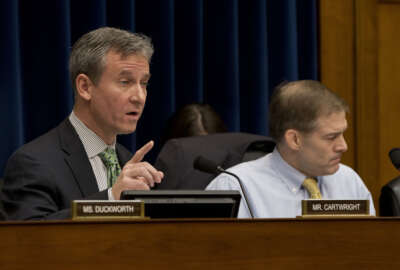To listen to the Federal Newscast on your phone or mobile device, subscribe on PodcastOne or iTunes.
- Agencies have their cybersecurity marching orders for 2018. The Office of Management and Budget used 2017 to develop a standard approach to measuring cyber risk across the government. Now for 2018, OMB wants agencies to use that methodology to conduct risk management assessments. As part of the 2018 Federal Information Security Management Act (FISMA) guidance issued yesterday, OMB told CFO Act agencies to update their data quarterly and non-CFO Act agencies to update their data on a semiannual basis. OMB said the metrics represent baseline security controls. OMB and DHS will use these metrics in the ongoing Risk Management Assessment process. (White House)
- The Homeland Security Department wants a new way to interact with industry. Called Engage DHS, the department has proposed developing a form to collect information during vendor meetings. It will use the info to prepare for meetings, to share information about previous interactions, and to keep track of how often the companies and DHS do meet. DHS said in an information request notice that it expects to collect data from about 750 meetings a year. (Federal Register)
- Fourteen states and the District of Columbia have voiced their opinion in a lawsuit against the Trump administration over the executive ban on transgender troops in the military. In an amicus brief, they argue the ban will harm their residents, saying it will cause a decrease in readiness in their respective National Guards. The states also said the ban keeps transgender students from joining the ROTC. States making the complaint include Maryland, Iowa and California. (Federal News Radio)
- EPA Administrator Scott Pruitt has curtailed the practice of settling lawsuits. Pruitt ordered the agency to stop so-called sue-and-settle cases, referring to when a special interest group sues the EPA, and the agency enters into a consent decree. Pruitt said the practice circumvents the regulatory process. His order requires plaintiffs to give 15 days advance notice of lawsuits. The agency must publicize the suit within another 15 days, and reach out to states and affected industries. (Environmental Protection Agency)
- IRS Commissioner John Koskinen said businesses can expect their tax preparers to require more personal information about their clients for the 2018 filing season. This will include tax payment history, and parent company data. Koskinen said the additional info will help protect against identity theft, one of its top management challenges listed by the Treasury Inspector General for Tax Administration. (Federal News Radio)
- Henry Kerner has received Senate confirmation to be the U.S. Special Counsel at the Office of Special Counsel. Kerner will take over an agency currently processing nearly 6,000 new cases and whistleblower disclosures a year. He replaces former Special Counsel Carolyn Lerner. (Office of Special Counsel)
- A Veterans Affairs employee in Phoenix, Arizona who blew the whistle on the department’s long wait lists back in 2014 said he is still facing retaliation. Sens. Chuck Grassley (R-Iowa) and Ron Johnson (R-Wis.) want to know what the agency plans to do. The employee said he’s gotten threats and had his car was vandalized. He also claims he was denied a promotion. (Sen. Chuck Grassley)
- The American Federation of Government Employees is concerned about the future of the Veterans Choice Program. The VA released its plan to revise the current program this week. It would eliminate the existing eligibility rules for veterans. But AFGE fears it’s another step towards privatizing the VA and a way to avoid filling VA’s nearly 50,000 vacancies. (Federal News Radio)
- A new estimate from the Pentagon said the military has about one-fifth more facilities than it actually needs to accomplish its missions. The report to Congress said the military services, combined, have about 19 percent more base infrastructure than they can put to meaningful use. And following an earlier direction from Congress itself, the estimate the Pentagon compiled is based on force structure estimates from 2012: in other words, a larger military than the one that exists today. Defense Secretary James Mattis said the report highlights the need for another round of base closures, since the cost of maintaining excess facilities is continuing to drain funds for training and modernization. (Federal News Radio)
Copyright
© 2024 Federal News Network. All rights reserved. This website is not intended for users located within the European Economic Area.
